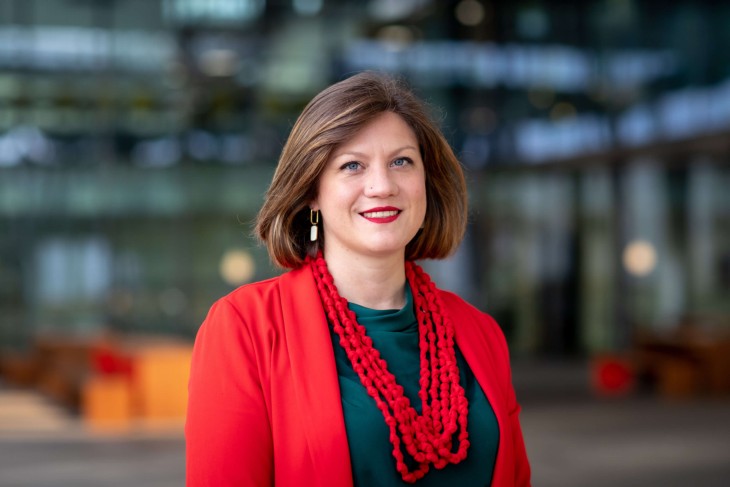 science HealthSupporting people with dementia and their loved ones with technologyFrancesca Toso, Assistant Professor in Human-Centred Design within the HCD Group at the University of Twente, is investigating whether technology can support people with dementia and their loved ones in coming to terms with the diagnosis, preparing for death, and dealing with bereavement. The University’s Technical Medical Centre (TechMed Centre) plays a key facilitating role in her research.
science HealthSupporting people with dementia and their loved ones with technologyFrancesca Toso, Assistant Professor in Human-Centred Design within the HCD Group at the University of Twente, is investigating whether technology can support people with dementia and their loved ones in coming to terms with the diagnosis, preparing for death, and dealing with bereavement. The University’s Technical Medical Centre (TechMed Centre) plays a key facilitating role in her research.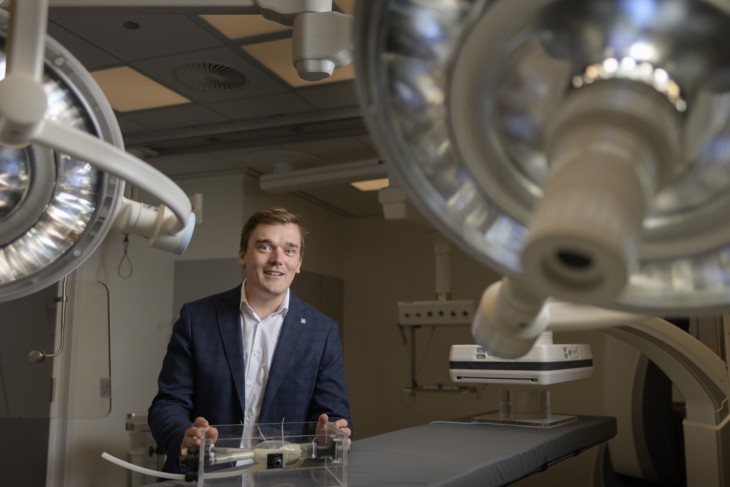 science HealthFrom code to care: how smart algorithms are changing the clinicThe Mathematics of Imaging & AI (MIA) research group at the University of Twente investigates the use of AI in medical imaging and image analysis, as well as the potential to extract more information from existing data than is currently possible. According to Associate Professor Dr Jelmer Wolterink, developments in this field must be applicable in clinical practice. The fact that he is familiar with both the technical and medical worlds is a key factor in this.
science HealthFrom code to care: how smart algorithms are changing the clinicThe Mathematics of Imaging & AI (MIA) research group at the University of Twente investigates the use of AI in medical imaging and image analysis, as well as the potential to extract more information from existing data than is currently possible. According to Associate Professor Dr Jelmer Wolterink, developments in this field must be applicable in clinical practice. The fact that he is familiar with both the technical and medical worlds is a key factor in this.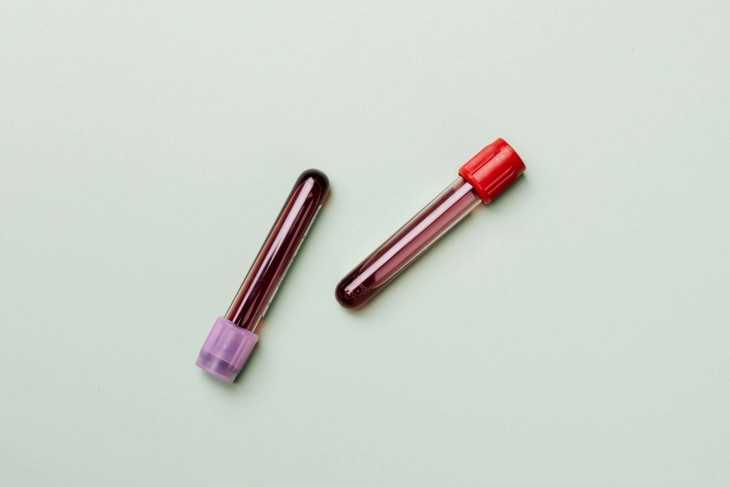 science HealthBehind the scenes of blood donation for researchEvery once in a while, in a quiet corner of the TechMed Centre of the University of Twente, anonymous employees roll up their sleeves and donate a small tube of blood. Not to save a life today, but to provide real human blood for scientific research.
science HealthBehind the scenes of blood donation for researchEvery once in a while, in a quiet corner of the TechMed Centre of the University of Twente, anonymous employees roll up their sleeves and donate a small tube of blood. Not to save a life today, but to provide real human blood for scientific research. science DigitalisationViolence against women in today’s society: how Communication Science students work towards a better futureThe Gisèle Pelicot case, the new Netflix series Adolescence, and the harmful effects of misogynistic influencers like Andrew Tate – violence against women is getting more traction in traditional media than ever before. Sadly, though, this increased awareness does not automatically translate into progress; globally, almost one in three women has experienced physical and/or sexual violence at least once in their lives*. That’s why, as part of their project, Communication Science students Carly, Ioanna, Leonie, and Nancy dove into the complex problem of violence against women in modern society.
science DigitalisationViolence against women in today’s society: how Communication Science students work towards a better futureThe Gisèle Pelicot case, the new Netflix series Adolescence, and the harmful effects of misogynistic influencers like Andrew Tate – violence against women is getting more traction in traditional media than ever before. Sadly, though, this increased awareness does not automatically translate into progress; globally, almost one in three women has experienced physical and/or sexual violence at least once in their lives*. That’s why, as part of their project, Communication Science students Carly, Ioanna, Leonie, and Nancy dove into the complex problem of violence against women in modern society.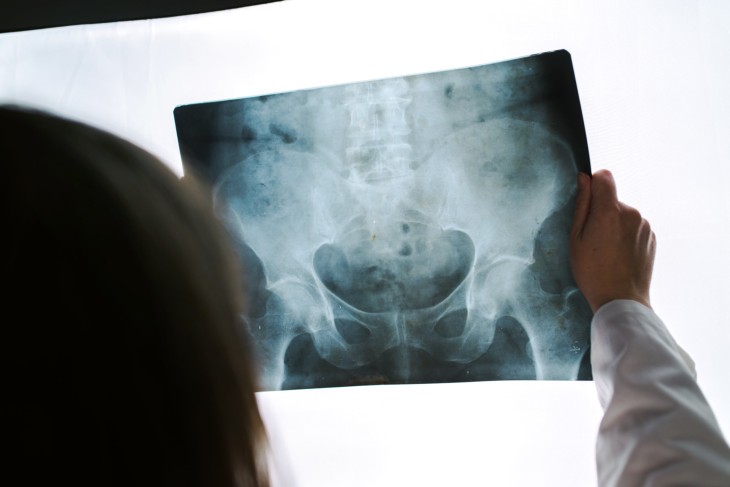 science HealthDeveloping AI that doctors can trustAI helps clinicians quickly find the information they need, filtering hundreds of reports and documents, automating processes, and preventing something from being overlooked. But traditional AI isn't safe enough when it comes to high-level tasks, such as diagnosing. Here, explainability is crucial. Unlike non-explainable models that operate like black boxes, explainable AI follows a clinically acceptable reasoning and reveals how it arrives at a decision, so doctors can evaluate whether its output is trustworthy.
science HealthDeveloping AI that doctors can trustAI helps clinicians quickly find the information they need, filtering hundreds of reports and documents, automating processes, and preventing something from being overlooked. But traditional AI isn't safe enough when it comes to high-level tasks, such as diagnosing. Here, explainability is crucial. Unlike non-explainable models that operate like black boxes, explainable AI follows a clinically acceptable reasoning and reveals how it arrives at a decision, so doctors can evaluate whether its output is trustworthy.
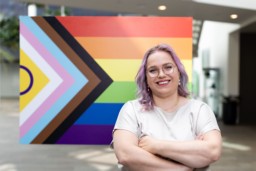 science HealthHow digital technology can support vulnerable groupsYou are young, struggling with your identity, and feel misunderstood by those around you. When you finally take the step to seek help, you find yourself on a two-year waiting list. In the meantime? Little to no support. For many LGBTQ young people, this is not a fictional scenario, but the harsh reality. The healthcare system is stuck: GPs are at a loss and psychological care is overloaded. But what if digital technology can play a role in this?
science HealthHow digital technology can support vulnerable groupsYou are young, struggling with your identity, and feel misunderstood by those around you. When you finally take the step to seek help, you find yourself on a two-year waiting list. In the meantime? Little to no support. For many LGBTQ young people, this is not a fictional scenario, but the harsh reality. The healthcare system is stuck: GPs are at a loss and psychological care is overloaded. But what if digital technology can play a role in this? science HealthBreastfeeding: what do we actually know about it?Babies drink milk, which often comes from the mother's breast. This breastfeeding is important for babies and mothers, but what do we actually know about it? Too little, according to adjunct professor Nienke Bosschaart at the University of Twente. That is why she develops new innovations to be able to look better into the breast.
science HealthBreastfeeding: what do we actually know about it?Babies drink milk, which often comes from the mother's breast. This breastfeeding is important for babies and mothers, but what do we actually know about it? Too little, according to adjunct professor Nienke Bosschaart at the University of Twente. That is why she develops new innovations to be able to look better into the breast.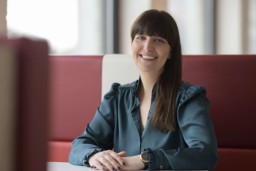 science HealthThis tool sees what you (don’t) feel: prolonged griefWe all face loss at some point in our lives. For some people, the grief becomes increasingly bearable, but others struggle with their grief for years. That is why researcher Lonneke Lenferink is working on the mourning meter, a scientifically validated questionnaire that measures the severity of grief and thus keeps an eye on it.
science HealthThis tool sees what you (don’t) feel: prolonged griefWe all face loss at some point in our lives. For some people, the grief becomes increasingly bearable, but others struggle with their grief for years. That is why researcher Lonneke Lenferink is working on the mourning meter, a scientifically validated questionnaire that measures the severity of grief and thus keeps an eye on it.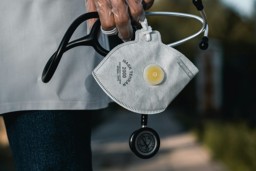 science HealthThis is why 'GeoHealth' is crucial in modern medicineUsing geographic information and geospatial technologies to map and analyse diseases and health risks – that is what Professor Justine Blanford of the University of Twente does. She discusses her work.
science HealthThis is why 'GeoHealth' is crucial in modern medicineUsing geographic information and geospatial technologies to map and analyse diseases and health risks – that is what Professor Justine Blanford of the University of Twente does. She discusses her work.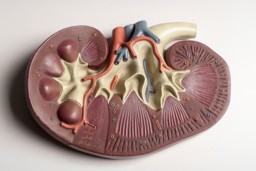 science HealthLab-grown kidney tubules: the key to a new treatment?For patients born with a congenital genetic kidney disease, finding treatment is often difficult. The complex structure of the kidney tubules makes it difficult to research to find solutions for this. Through close collaboration between researchers from the Radboudumc and the University of Twente (Technical Medical Centre) and with the help of a grant from the TURBO program, treatment for these patients can get closer.
science HealthLab-grown kidney tubules: the key to a new treatment?For patients born with a congenital genetic kidney disease, finding treatment is often difficult. The complex structure of the kidney tubules makes it difficult to research to find solutions for this. Through close collaboration between researchers from the Radboudumc and the University of Twente (Technical Medical Centre) and with the help of a grant from the TURBO program, treatment for these patients can get closer.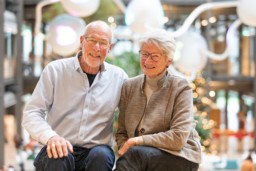 science HealthAfter 17 years of 'acting', Leo and Anita take their final bow as simulation patients“We joined the UT together. I applied for the role of simulation patient, and my husband planned to be the driver and read a book,” says Anita Lettink (78). At least, that was the plan, but things turned out quite differently.
science HealthAfter 17 years of 'acting', Leo and Anita take their final bow as simulation patients“We joined the UT together. I applied for the role of simulation patient, and my husband planned to be the driver and read a book,” says Anita Lettink (78). At least, that was the plan, but things turned out quite differently.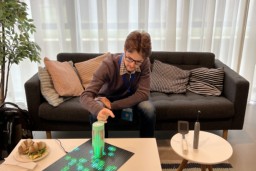 science HealthTurning everyday objects into tools for recoveryWhen people recover from a stroke, they often start by doing exercises in a clinic. But once they go home, they need to keep exercising to keep their hands and wrists functional. These exercises can feel boring and hard to stick to. Many people skip the recommended 30 minutes of daily exercises, which slows down or reverses their recovery. But what if brushing your teeth or drinking your morning coffee could help you get better?
science HealthTurning everyday objects into tools for recoveryWhen people recover from a stroke, they often start by doing exercises in a clinic. But once they go home, they need to keep exercising to keep their hands and wrists functional. These exercises can feel boring and hard to stick to. Many people skip the recommended 30 minutes of daily exercises, which slows down or reverses their recovery. But what if brushing your teeth or drinking your morning coffee could help you get better? science HealthHow wearables can help reduce stress for daily well-beingThe research project Stress in Action involves collaboration among seven Dutch universities and university medical centres (UMCs) in a long-term study on stress. The goal of this ten-year project is to develop methods for monitoring and reducing stress in daily life, ultimately aiming to prevent stress-related illnesses. Professor of Health Psychology Matthijs Noordzij (Faculty of BMS) from the University of Twente, who is also affiliated with the Technical Medical Centre (TechMed Centre), plays a crucial role in the project with his expertise in wearable technologies.
science HealthHow wearables can help reduce stress for daily well-beingThe research project Stress in Action involves collaboration among seven Dutch universities and university medical centres (UMCs) in a long-term study on stress. The goal of this ten-year project is to develop methods for monitoring and reducing stress in daily life, ultimately aiming to prevent stress-related illnesses. Professor of Health Psychology Matthijs Noordzij (Faculty of BMS) from the University of Twente, who is also affiliated with the Technical Medical Centre (TechMed Centre), plays a crucial role in the project with his expertise in wearable technologies.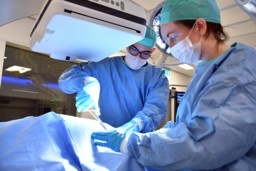 science HealthHow much smarter can your healthcare become with AI?Imagine your next medical treatment being faster, more precise, and better tailored to your personal needs. Artificial Intelligence (AI) is making this possible. At the labs of the University of Twente, researchers are working daily on innovative solutions that are transforming healthcare. From faster diagnoses to supporting doctors with complex procedures, AI is paving the way for a more efficient and future-proof healthcare system.
science HealthHow much smarter can your healthcare become with AI?Imagine your next medical treatment being faster, more precise, and better tailored to your personal needs. Artificial Intelligence (AI) is making this possible. At the labs of the University of Twente, researchers are working daily on innovative solutions that are transforming healthcare. From faster diagnoses to supporting doctors with complex procedures, AI is paving the way for a more efficient and future-proof healthcare system.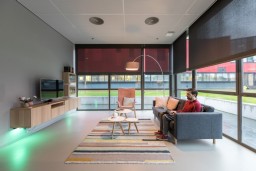 science HealthHow digital technology places less burden on healthcareImagine a digital flower that blooms when you hit your daily excercise goal or wilts when you miss a medication dose. Creative technology like this, designed by students and researchers at the University of Twente, is part of the network of the expertise Centre for Remote Monitoring & Coaching (eCMC), an initiative of TechMed Centre of University of Twente.
science HealthHow digital technology places less burden on healthcareImagine a digital flower that blooms when you hit your daily excercise goal or wilts when you miss a medication dose. Creative technology like this, designed by students and researchers at the University of Twente, is part of the network of the expertise Centre for Remote Monitoring & Coaching (eCMC), an initiative of TechMed Centre of University of Twente.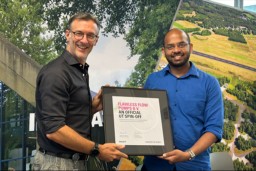 science HealthUT scientist Keerthi makes dream come true with his own spin-off companySome researchers start their PhD to contribute to fundamental research, while others dream of starting their own company based on their research. Keerthivasan Rajamani (Keerthi for short) was one of those entrepreneurial researchers. He founded UT spin-off Flawless Flow Pumps based on his research on magnetic pumps. He shares his journey from researcher to entrepreneur.
science HealthUT scientist Keerthi makes dream come true with his own spin-off companySome researchers start their PhD to contribute to fundamental research, while others dream of starting their own company based on their research. Keerthivasan Rajamani (Keerthi for short) was one of those entrepreneurial researchers. He founded UT spin-off Flawless Flow Pumps based on his research on magnetic pumps. He shares his journey from researcher to entrepreneur. science HealthHow mini hearts-on-chips can save millionsEvery year, cardiovascular disease impacts over 126 million people worldwide. In the quest for effective treatments, researchers are tirelessly working to develop better solutions. However, current animal and test-tube models often fall short in predictive accuracy. Prof. Dr. Robert Passier is at the forefront of this research, combining advanced technologies to create innovative human heart models that function like real human hearts. This groundbreaking invention could lead to safer medications and reduced reliance on animal testing in research.
science HealthHow mini hearts-on-chips can save millionsEvery year, cardiovascular disease impacts over 126 million people worldwide. In the quest for effective treatments, researchers are tirelessly working to develop better solutions. However, current animal and test-tube models often fall short in predictive accuracy. Prof. Dr. Robert Passier is at the forefront of this research, combining advanced technologies to create innovative human heart models that function like real human hearts. This groundbreaking invention could lead to safer medications and reduced reliance on animal testing in research.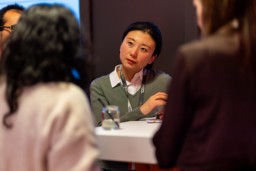 science HealthBreakthrough in medical technology: accurately measuring blood flowWhen performing certain surgeries, such as skin transplantations, it’s essential to monitor blood flow. Sufficient blood flow indicates whether or not the skin is alive. Surgeons currently determine this blood flow by a green dye injection and visual examination with the naked eye. To make this process more accurate and effective, UT spin-off Twente Medical Optics developed a handheld device to measure the blood flow during and after surgery. CEO Kiki Liu shares the story of their innovation.
science HealthBreakthrough in medical technology: accurately measuring blood flowWhen performing certain surgeries, such as skin transplantations, it’s essential to monitor blood flow. Sufficient blood flow indicates whether or not the skin is alive. Surgeons currently determine this blood flow by a green dye injection and visual examination with the naked eye. To make this process more accurate and effective, UT spin-off Twente Medical Optics developed a handheld device to measure the blood flow during and after surgery. CEO Kiki Liu shares the story of their innovation.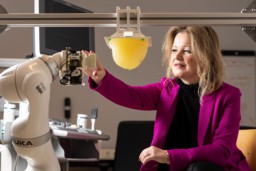 science RoboticsThese robots will help detect and treat cancerAt the laboratories of the University of Twente, researchers are working on robotics that will improve healthcare. These studies aim to make care more personalised and precise, ensuring that every patient receives the treatment that suits them best. While robots are already used in healthcare, in the future they will be deployed even more frequently. In this story, we’ll look at how robotics is helping to detect and treat cancer.
science RoboticsThese robots will help detect and treat cancerAt the laboratories of the University of Twente, researchers are working on robotics that will improve healthcare. These studies aim to make care more personalised and precise, ensuring that every patient receives the treatment that suits them best. While robots are already used in healthcare, in the future they will be deployed even more frequently. In this story, we’ll look at how robotics is helping to detect and treat cancer.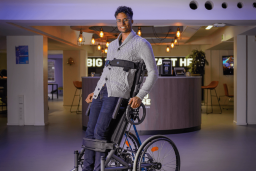 science HealthThis is the wheelchair of the futureWithin innovation cluster MedTech Twente, people are working on tomorrow's healthcare. UT alumnus Gabriel Costa and Stephanie Jansen, founders of spin-off company J58, talk about the importance of patient-centred innovations, the ecosystem in Twente and making an impact.
science HealthThis is the wheelchair of the futureWithin innovation cluster MedTech Twente, people are working on tomorrow's healthcare. UT alumnus Gabriel Costa and Stephanie Jansen, founders of spin-off company J58, talk about the importance of patient-centred innovations, the ecosystem in Twente and making an impact.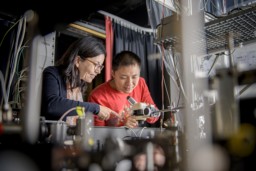 science HealthNovel device for fast detection of sepsisWithin a newly funded project SepsPIC (Highly multiplexed photonics integrated circuit (PIC) sensors for the rapid diagnostics of sepsis), UT Professor Sonia García Blanco and her colleagues are working on a novel device for fast and accurate detection of sepsis. ‘If we are successful, it could dramatically decrease mortality among patients.’
science HealthNovel device for fast detection of sepsisWithin a newly funded project SepsPIC (Highly multiplexed photonics integrated circuit (PIC) sensors for the rapid diagnostics of sepsis), UT Professor Sonia García Blanco and her colleagues are working on a novel device for fast and accurate detection of sepsis. ‘If we are successful, it could dramatically decrease mortality among patients.’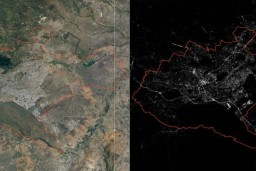 science TechnologyHow satellites expose urban inequalities in the Global SouthMass evictions, daily power outages, and pitch-black streets at night: the challenges that people in the Global South face remain largely overlooked. How can satellite imagery uncover the hidden realities of urbanisation? Prof. Dr. Monika Kuffer’s research strives to spotlight urban inequalities and prompt policymakers to take action.
science TechnologyHow satellites expose urban inequalities in the Global SouthMass evictions, daily power outages, and pitch-black streets at night: the challenges that people in the Global South face remain largely overlooked. How can satellite imagery uncover the hidden realities of urbanisation? Prof. Dr. Monika Kuffer’s research strives to spotlight urban inequalities and prompt policymakers to take action.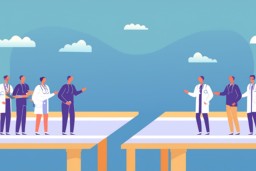 science HealthBeyond borders: this is the future of specialist careEnsuring access to specialist care at peak periods is challenging, especially in sparsely populated areas with fewer available healthcare specialists. Project BRIDGE tries to tackle this issue in an unconventional way: hospitals in the German-Dutch border region are joining forces to share healthcare personnel. As simple as this sounds, is it so in practice?
science HealthBeyond borders: this is the future of specialist careEnsuring access to specialist care at peak periods is challenging, especially in sparsely populated areas with fewer available healthcare specialists. Project BRIDGE tries to tackle this issue in an unconventional way: hospitals in the German-Dutch border region are joining forces to share healthcare personnel. As simple as this sounds, is it so in practice?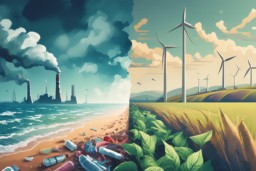 science Circular EconomyThe plastics dilemma: Are biodegradable plastics the answer?We are living in the Plastic Age, such is the ubiquity of plastics in our lives. The plastic waste in water ecosystems alone is expected to nearly triple from 11 million tonnes in 2016 to 29 million tonnes in 2040*. Biodegradable materials, such as polylactic acid, are seen as an alternative for use in packaging, agriculture, and medical devices. But how biodegradable are these materials in reality? Could they be the plastics of the future?
science Circular EconomyThe plastics dilemma: Are biodegradable plastics the answer?We are living in the Plastic Age, such is the ubiquity of plastics in our lives. The plastic waste in water ecosystems alone is expected to nearly triple from 11 million tonnes in 2016 to 29 million tonnes in 2040*. Biodegradable materials, such as polylactic acid, are seen as an alternative for use in packaging, agriculture, and medical devices. But how biodegradable are these materials in reality? Could they be the plastics of the future?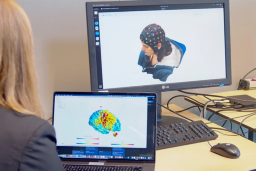 science HealthHow do weak electric fields affect deep brain stimulation?Researcher Bettina Schwab was awarded an ERC Starting Grant in September 2023 for her research on deep brain stimulation. With her project ‘DECODE’ she investigates the influence of this unexplored factor of deep brain stimulation: weak electric fields.
science HealthHow do weak electric fields affect deep brain stimulation?Researcher Bettina Schwab was awarded an ERC Starting Grant in September 2023 for her research on deep brain stimulation. With her project ‘DECODE’ she investigates the influence of this unexplored factor of deep brain stimulation: weak electric fields.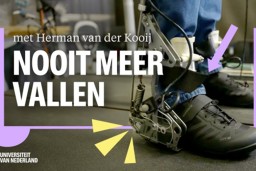 science HealthThis device will keep you from fallingGetting smarter, stronger and faster with technology. That is what UT professor Herman van der Kooij and his team are researching every day. At 'Universiteit van Nederland', he talks about the bionic man.
science HealthThis device will keep you from fallingGetting smarter, stronger and faster with technology. That is what UT professor Herman van der Kooij and his team are researching every day. At 'Universiteit van Nederland', he talks about the bionic man.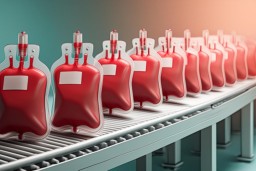 science HealthThe blood substitute that could save livesDoctors need blood to treat certain cancers, anaemia, and other blood-related illnesses, but also need it in emergency or scheduled surgeries. Most people are unaware, but blood shortages are quite frequent and can happen anytime. Blood donors are always needed. Francisca Fernandes Gomes, PhD student at the University of Twente, aims to create synthetic, artificial blood that can replace the need for donated blood. In this story she explains her work.
science HealthThe blood substitute that could save livesDoctors need blood to treat certain cancers, anaemia, and other blood-related illnesses, but also need it in emergency or scheduled surgeries. Most people are unaware, but blood shortages are quite frequent and can happen anytime. Blood donors are always needed. Francisca Fernandes Gomes, PhD student at the University of Twente, aims to create synthetic, artificial blood that can replace the need for donated blood. In this story she explains her work.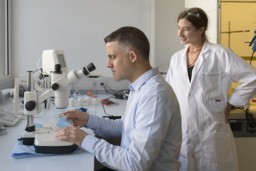 science HealthNeedle-free insulin injections are on the wayLee Calladine has been diabetic for 25 years and the insulin top-up routine is so familiar to him that he’s long past feeling squeamish about piercing his skin. Still, the practice is burdensome. Scientists at the TechMed Centre of the University of Twente are closing in on a pain-free method for people like Calladine.
science HealthNeedle-free insulin injections are on the wayLee Calladine has been diabetic for 25 years and the insulin top-up routine is so familiar to him that he’s long past feeling squeamish about piercing his skin. Still, the practice is burdensome. Scientists at the TechMed Centre of the University of Twente are closing in on a pain-free method for people like Calladine.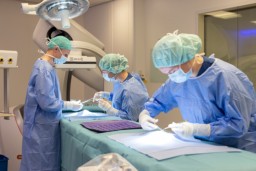 science HealthPushing boundaries in these medical labs at the University of TwenteEnter the fascinating world of medical science with this digital tour of the University of Twente's TechMed Centre!
science HealthPushing boundaries in these medical labs at the University of TwenteEnter the fascinating world of medical science with this digital tour of the University of Twente's TechMed Centre!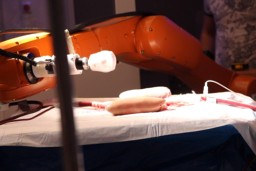 science HealthMini robot doctors inside your bodyA surgeon swimming through your body, it sounds like science fiction now, but it might be closer than you think. At the TechMed Centre at the University of Twente, tiny robots were already swimming through a detached aorta with kidneys. Discover the future of vascular surgery.
science HealthMini robot doctors inside your bodyA surgeon swimming through your body, it sounds like science fiction now, but it might be closer than you think. At the TechMed Centre at the University of Twente, tiny robots were already swimming through a detached aorta with kidneys. Discover the future of vascular surgery.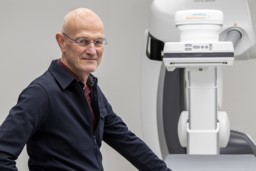 science HealthFake surgery: 'miraculous scientific research'Is 'band syndrome' (bloating after eating) a medical condition or a psychological problem? That question has occupied medical science for decades. Prof Bob Geelkerken, professor at the TechMed Centre at the University of Twente and surgeon at Medisch Spectrum Twente, uses a special method to dispel the question marks once and for all: fake surgery.
science HealthFake surgery: 'miraculous scientific research'Is 'band syndrome' (bloating after eating) a medical condition or a psychological problem? That question has occupied medical science for decades. Prof Bob Geelkerken, professor at the TechMed Centre at the University of Twente and surgeon at Medisch Spectrum Twente, uses a special method to dispel the question marks once and for all: fake surgery.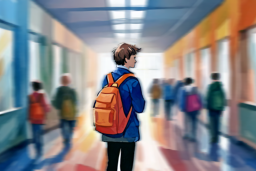 science TechnologySmartwatches measuring loneliness among young peopleSmartwatches that map loneliness among students with specific needs, such as autism. Thanks to UT professor Carolien Rieffe and her team, this will soon be a reality. Carolien received a substantial sum of money from science financier NWO for the Building 4 Belonging project.
science TechnologySmartwatches measuring loneliness among young peopleSmartwatches that map loneliness among students with specific needs, such as autism. Thanks to UT professor Carolien Rieffe and her team, this will soon be a reality. Carolien received a substantial sum of money from science financier NWO for the Building 4 Belonging project.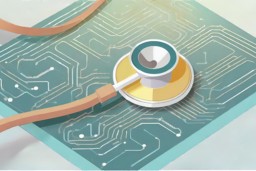 science HealthThe rise of the virtual doctorIf a family member has an inherited heart condition, there is a chance that you have it too. Usually, you will then receive a letter with information and an invitation for an interview about possible DNA testing. Researchers at the University of Twente are now testing whether they can approach people via a virtual doctor.
science HealthThe rise of the virtual doctorIf a family member has an inherited heart condition, there is a chance that you have it too. Usually, you will then receive a letter with information and an invitation for an interview about possible DNA testing. Researchers at the University of Twente are now testing whether they can approach people via a virtual doctor.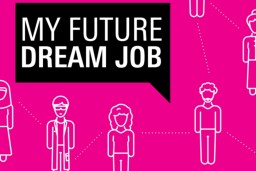 science HealthPodcast #2: The hypothesis extractorExplore the future in our podcast series, "My Future Dream Job," where Anic van Damme guides you to the year 2030. Our scientists explore prospective careers in cybersecurity, climate adaptation, and energy transition. Listen in to gain insights into the professions taking shape at the University of Twente.
science HealthPodcast #2: The hypothesis extractorExplore the future in our podcast series, "My Future Dream Job," where Anic van Damme guides you to the year 2030. Our scientists explore prospective careers in cybersecurity, climate adaptation, and energy transition. Listen in to gain insights into the professions taking shape at the University of Twente.